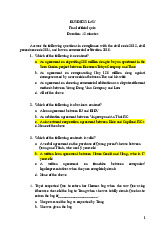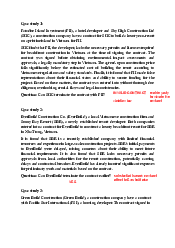







































































































































Preview text:
NATIONAL ASSEMBLY
SOCIALIST REPUBLIC OF VIETNAM --------
Independence - Freedom - Happiness --------------- No. 59/2020/QH14 Hanoi, June 17, 2020 LAW ON ENTERPRISES
Pursuant to the Constitution of the Socialist Republic of Vietnam;
The National Assembly promulgates the Law on Enterprises. Chapter I GENERAL PROVISIONS Article 1. Scope
This Law provides for establishment, management, reorganization, dissolution and relevant
activities of enterprises, including limited liability companies, joint stock companies,
partnerships and sole proprietorships; groups of companies.
Article 2. Regulated entities 1. Enterprises.
2. Organizations and individuals relevant to establishment, management, reorganization,
dissolution and relevant activities of enterprises.
Article 3. Application of the Law on Enterprises and other laws
In case there are other laws that provide for establishment, management, reorganization,
dissolution and relevant activities of special enterprises, regulations of these laws shall apply. Article 4. Definitions
For the purpose of this document, the terms below are construed as follows:
1. “copy” means a copy extracted from master register or a copy that has been certified by a
competent organization or compared to the original document.
2. “foreigner” means a person who has a foreign nationality according to his/her documents.
3. “shareholder” means the individual or organization that holds at least a share of a joint stock company.
4. “founding shareholder” means a shareholder that holds at least an ordinary share and has
his/her signature in the list of shareholders that are also founder of the joint stock company.
5. “dividend” means a net profit on each share in cash or other assets.
6. A “company” can be a limited liability company, joint stock company or partnership.
7. A “limited liability company” can be a single-member limited liability company or multiple-
member limited liability company.
8. “National Enterprise Registration Portal” means a web portal used for enterprise registration
and access and publishing of enterprise registration.
9. “national enterprise registration database” means the collection of nationwide enterprise registration data.
10. “enterprise” means an organization that has a proper name, assets, premises, is established or
registered in accordance with law for business purposes.
11. A “state-owned enterprise” means an enterprise more than 50% charter capital or voting
shares of which is held by the State as prescribed in Article 88 of this Law.
12. A “Vietnamese enterprise” means an enterprise that is registered in accordance with
Vietnam’s law and has its headquarters located within Vietnam.
13. “mailing address” means the address registered as the headquarters of an organization; the
permanent residence, working place or another address of an individual that is registered as
mailing address with an enterprise.
14. “market value” of a stake or share means the price at which the stake or share is traded on the
market at the nearest time, the price agreed on by the buyer and the seller, or the price
determined by a valuation organization.
15. “Certificate of Enterprise Registration” means a physical or electronic document bearing
enterprise registration information provided for the enterprise by a business registration authority.
16. “legal documents” of an individual include the ID card (old or new format), passport and
other legal personal identification documents.
17. “legal documents” of an enterprise include the Establishment Decision, Certificate of
Enterprise Registration and equivalent documents.
18. “capital contribution” means the contribution of capital as charter capital to establish a new
company or contribution of additional capital to an existing company.
19. “National Enterprise Registration Information System” includes the National Enterprise
Registration Portal, national enterprise registration database, relevant databases and technical infrastructure.
20. “valid application” means an application that contains adequate documents specified in this
Law and all the documents are completed as prescribed by law.
21. “business” or “business operation” means continuous execution of one, some or all stages
including investment, manufacturing, sale or provision of services on the market for profit.
22. “relatives” of a person include: the spouse, biological parents, adoptive parents, parents-in-
laws, biological children, adopted children, children-in-law, biological siblings, siblings-in-law
and biological siblings of the spouse.
23. “related person” means any individual or organization that has a direct or indirect
relationship with an enterprise in the following cases:
a) The parent company, its executive and legal representative, and the person who has the power
to designate the executive officer of the parent company;
b) The subsidiary company, its executive and legal representative;
c) Any individual, organization or group of individuals or organizations that can influence the
enterprise’s operation through ownership, acquisition of shares/stakes or making corporal decisions;
d) The enterprise’s executive, legal representative, controllers;
dd) Spouses, biological parents, adoptive parents, parents-in-laws, biological children, adopted
children, children-in-law, biological siblings, siblings-in-law and biological siblings of spouses
of the executive officer, legal representative, controllers, members/partners and shareholders
holding the controlling stakes/shares;
e) Any individual that is the authorized representative of the companies or organizations
mentioned in Point a, b and c of this Clause;
g) Any enterprise in which an individual, company or organization mentioned in Points a, b, c, d,
dd and e of this Clause has the controlling interest.
24. “executive of an enterprise means the owner of a sole proprietorship, a general partner of a
partnership, chairperson or member of the Member/Partner Assembly, President of a company,
President or member of the Board of Directors, Director/General Director, or holder of another
managerial position prescribed in the company’s charter.
25. “founder” means the individual or organization that establishes or contributes capital to establish an enterprise.
26. “foreign investor” means an individual or organization as defined by the Law on Investment.
27. “stake” means the total value of assets that a member/partner has contributed or promises to
contribute to a limited liability company/partnership. “holding” means the ratio of a
member/partner’s stake to the charter capital of the limited liability company/partnership.
28. “public products and services” are essential products and services of a country, area or
community, thus have to be maintained by the State for assurance of common interests or
defense and security, and the costs of provision of which under market mechanism are hardly recoverable.
29. “member” or “partner” means the individual or organization that holds part or all of charter
capital of a limited liability company or partnership.
30. A “partner” of a partnership can be a general partner or limited partner.
31. “reorganization” of an enterprise means the full division, partial division, consolidation,
acquisition or conversion of an enterprise.
32. “foreign organization” means an organization established overseas under the foreign country’s laws.
33. “voting capital” means the stake or share that endows the holder the right to vote on the
issues within the jurisdiction of the Board of Members or General Meeting of Shareholders.
34. “charter capital” means the total value of assets that have been contributed or promised by
the members/partners/owners when the limited liability company or partnership is established; or
the total of nominal values of the sold or subscribed shares when a joint stock company is established.
Article 5. Protection of enterprises and their owners by the State
1. The State recognizes the long-term existence and development of the types of enterprises
prescribed in this Law; ensures equality of enterprises before the law regardless of their types of
business and economic sector; recognizes lawful profitability of business operation.
2. The State recognizes and protects the rights to ownership of assets, capital, income, other
lawful rights and interests of enterprises and their owners.
3. Lawful assets and capital of enterprises and their owners shall not be nationalized or
administratively confiscated. Unless strictly necessary, the State may purchase or requisition
assets of enterprises, in which case these enterprises shall be paid or reimbursed for in
accordance with regulations of law on purchase and requisitioning of assets and in a manner that
ensures the enterprises’ interests and non-discrimination among the types of business.
Article 6. Internal political organizations, socio-political organizations and employee
representative organizations of enterprises
1. The internal political organization, socio-political organization and employee representative
organization of an enterprise shall operate in accordance with the Constitution, the law and the enterprise’s charter.
2. Enterprises shall respect and not obstruct the establishment of internal political organizations,
socio-political organizations and employee representative organizations; must not obstruct
participation of their employees in such organizations.
Article 7. Rights of enterprises
Every enterprise has the right to:
1. Freely engage in any business line that is not banned by law.
2. Freely run the business and choose a type of business organization; choose business lines, area
of operation and type of operation; change the scale of business and business lines.
3. Choose the method of mobilizing, distributing and using capital.
4. Freely find markets, customers and enter into contracts. 5. Export and import.
6. Hire employees in accordance with employment laws.
7. Apply technological advances to improve business efficiency; have intellectual property rights
protected in accordance with intellectual property laws.
8. Acquire, use, dispose of their assets.
9. Reject unlawful requests for provision of resources from other organizations and individuals.
10. File complaints and participate in proceedings as prescribed by law.
11. Other rights prescribed by law.
Article 8. Obligations of enterprises
1. Maintain the fulfillment of conditions for conducting restricted business lines and business
lines restricted to foreign investors (hereinafter referred to as “restricted business lines”)
prescribed by law throughout the course of business operation.
2. Apply for enterprise registration; register changes to enterprise registration information;
publish information about the establishment and operation of the enterprise; submit reports and
fulfill other obligations prescribed by this Law.
3. Take responsibility for the accuracy of information in the enterprise registration application
and reports; promptly rectify incorrect information if found.
4. Organize accounting works; pay taxes and fulfill other financial obligations prescribed by law.
5. Protect lawful rights and interests of employees as prescribed by law; do not discriminate
against or insult employees; do not mistreat or force employees to work; do not employ minors
against the law; enable employees to improve their vocational skills through training; buy social
insurance, unemployment insurance, health insurance and other insurance for employees as prescribed by law.
6. Other obligations prescribed by law.
Article 9. Rights and obligations of enterprises providing public products and services
An enterprise providing public products and services shall:
1. Have the rights and obligations specified in Article 7, Article 8 and relevant regulations of this Law.
2. Be reimbursed in accordance with bidding laws or collect payments as prescribed by competent authorities.
3. Have appropriate time to provide products/services to recoup investment and make reasonable profit.
4. Provide products/services with adequate quantity, good quality and on schedule at the prices
imposed by competent authorities.
5. Ensure fairness and convenience for customers.
6. Take legal responsibility for the quantity, quality, supply conditions and prices for their products/services.
Article 10. Criteria, rights and obligations of social enterprises 1. A social enterprise shall:
a) Be registered in accordance with this Law;
b) Operate for the purposes of resolving social and environmental issues for public interests;
c) Use at least 51% of the annual post-tax profit for re-investment to achieved registered targets.
2. In addition to the rights and obligations of an enterprise prescribed in this Law, a social
enterprise also has the following rights and obligations:
a) The owner or executive of a social enterprise shall be enabled to obtain relevant licenses and
certificates prescribed by law;
b) A social enterprise may raise and receive donations from individuals, enterprises, non-
governmental organizations and other Vietnamese and foreign organizations to cover its
administrative expenses and operating costs;
c) Adhere to the objectives and fulfill the conditions specified in Point b and Point c Clause 1 of
this Article throughout its course of operation;
b) Do not use donations for purposes other than covering administrative expenses and operating
costs and resolving the social and environmental issues registered by the enterprise;
dd) When receiving donations and aids, submit annual reports on the enterprise’s operation to a competent authority;
3. Inform the competent authority when an social or environmental objective is terminated or
profit is not used for re-investment in accordance with Point b and Point c Clause 1 of this Article.
4. The State shall adopt policies to encourage and assist in development of social enterprises.
5. The Government shall elaborate this Article.
Article 11. Document retention
1. An enterprise, depending on its type of business, shall retain the following documents:
a) The charter, internal rules and regulations; the member/partner/shareholder register;
b) The certificate of Industrial property rights; the certificate of registration of product/service
quality; other licenses and certificates;
c) Documents proving the enterprise’s ownership of its assets;
d) Votes, vote counting records, minutes of meetings of the Board of Members/Partners, General
Meeting of Shareholders, Board of Directors; the enterprise’s decisions;
dd) The prospectus for offering or listing securities;
e) Reports of the Board of Controllers, verdicts of inspecting authorities and audit organizations;
g) Accounting books, accounting records and annual financial statements.
2. The documents mentioned in Clause 1 of this Article shall be retained at the enterprise’s
headquarters or another location specified in the enterprise’s charter for a period of time prescribed by law.
Article 12. The enterprise’s legal representative
1. The enterprise’s legal representative is the person that, on behalf of the enterprise, exercises
and performs the rights and obligations derived from the enterprise’s transactions, acts as the
plaintiff, defendant or person with relevant interests and duties before in court, arbitration, and
performs other rights and obligations prescribed by law.
2. A limited liability company or joint stock company may have one or more than one legal
representative. The enterprise’s charter shall specify the quantity, position, rights and obligations
of its legal representatives. In case there are more than one legal representative, the charter shall
specify the rights and obligations of each of them. Otherwise, each of the legal representatives
shall fully representative the enterprise and take joint responsibility for any damage to the
enterprise as prescribed by civil laws and relevant laws.
3. An enterprise shall have at least one legal representative residing in Vietnam. Whenever this
representative leaves Vietnam, he/she has to authorize another Vietnamese resident, in writing, to
act as the legal representative, in which case the authorizing person is still responsible for the
authorized person’s performance.
4. In case the authorizing person has not returned to Vietnam when the letter of authorization
mentioned in (3) expires and does not have any further actions:
a) In case the enterprise is a sole proprietorship, the authorized person shall continue acting as
the enterprise’s legal representative until the authorizing person returns;
b) In case the enterprise is a limited liability company, joint stock company or partnership, the
authorized person shall continue acting as the enterprise’s legal representative until the
authorizing person returns or until the enterprise’s owner, Board of Members/Partners or Board
of Directors designates another legal representative.
5. In case the only legal representative of an enterprise she is not present in Vietnam for more
than 30 days without authorizing another person to act as the enterprise’s legal representative, or
is dead, missing, facing criminal prosecution, kept in temporary detention, serving an
imprisonment sentence, serving an administrative penalty in a correctional institution or
rehabilitation center, has limited legal capacity or is incapacitated, has difficulty controlling
his/her own behaviors, is banned by the court from holding certain positions or doing certain
works, the enterprise’s owner, Board of Members/Partners or Board of Directors shall appoint
another legal representative, except for the cases specified in Clause 6 of this Article.
6. In a two-member limited liability company, if the member who is the company’s legal
representative is dead, missing, facing criminal prosecution, kept in temporary detention,
serving an imprisonment sentence, serving an administrative penalty in a correctional institution
or rehabilitation center, making getaway; has limited legal capacity or is incapacitated, has
difficulty controlling his/her own behaviors, is banned by the court from holding certain
positions or doing certain works, the other member shall obviously assume the position of the
company’s legal representative until the Board of Members issues a new decision on the
company’s legal representative.
7. The court and other proceeding authorities are entitled to appoint the legal representative who
participates in proceedings as prescribed by law.
Article 13. Responsibilities of the enterprise’s legal representative
1. An enterprise’s legal representative shall:
a) Exercise and perform his/her rights and obligations in an honest and prudent manner to protect
the enterprise’s lawful interests;
b) Be loyal to the enterprise’s interests; not abuse his/her power and position or use the
enterprise’s information, secrets, business opportunities and assets for personal gain or serve any
other organization’s or individual’s interests;
c) Promptly and fully provide the enterprise with information about the enterprises that he/she or
his/her related person owns or has shares/stakes in as prescribed in this Law.
2. The enterprise’s representative shall be personally responsible for any damage to the enterprise
within the limits of responsibilities specified in Clause 1 of this Article.
Article 14. Authorized representatives of the owner/members/partners/shareholders that are organizations
1. Authorized representatives of the owner/members/partners/shareholders that are organizations
shall be authorized in writing by the owner/members/partners/shareholders in accordance with this Law.
2. Unless otherwise prescribed by the charter, the designation of the authorized representative
shall comply with the following regulations:
a) An organization that is a member of a multiple-member limited liability company and holds at
least 35% of charter capital may designate up to 03 authorized representatives;
b) An organization that is a shareholder of a joint stock company and holds at least 10% of
ordinary shares may designate up to 03 authorized representatives.
3. In case the owner/members/partners/shareholders designate more than one authorized
representative, the holding represented by each of them shall be specified. Otherwise, the total
holding shall be equally divided among the authorized representatives.
4. The document designating the authorized representative shall be informed to the company, be
effective on the date it is received by the company and contain the following information:
a) Names, enterprise identification (EID) numbers, headquarters addresses of the
owner/members/partners/shareholders;
b) Quantity of authorized representatives and their holdings;
c) Full name, mailing address, nationality, legal document number of each authorized representative;
d) The beginning date and duration of authorization of each authorized representative;
dd) Full names and signatures of the legal representatives of the
owner/members/partners/shareholders and of the authorized representatives.
5. An authorized representative shall satisfy the following requirements:
a) The authorized representative is not an entity specified in Clause 2 Article 17 of this Law;
b) Members/partners/shareholders of state-owned enterprises prescribed in Point b Clause 1
Article 88 of this Law must not designate a relative of the executive and the person having the
power to designate the executive as representative of another company;
c) Other requirements specified in the company’s charter.
Article 15. Responsibilities of authorized representatives of the
owner/members/partners/shareholders that are organizations
1. Authorized representatives of the owner/members/partners/shareholders shall exercise and
perform their rights and obligations in accordance with this Law. All limits imposed by the
owner/members/partners/shareholders to the authorized representatives’ performance at the
Board of Members/Partners or General Meeting of Shareholders shall not apply to any third party.
2. Authorized representatives have the responsibility to attend all meetings of the Board of
Members/Partners or General Meeting of Shareholders; exercise and perform the authorized
rights and obligations in an honest and prudent manner to protect lawful interest of the
owner/members/partners/shareholders that designated them.
3. Authorized representatives shall be responsible to the owner, members/partners/shareholders
for fulfillment of the responsibilities specified in this Article. The owner,
members/partners/shareholders that designate these authorized representatives shall be
responsible to third parties for performance of these authorized representative.
Article 16. Prohibited actions
1. Issuing or refusing to issue the Certificate of Enterprise registration against regulations of this
Law; requesting the founder to submit additional documents against regulations of this Law;
delaying, obstructing, harassing enterprise founders and business operation of enterprises.
2. Obstructing the enterprise’s owner, members/partners/shareholders from performing their
rights and obligations prescribed in this Law and the enterprise’s charter.
3. Doing business as an enterprise without applying for enterprise registration; carrying on
busines operation after the Certificate of Enterprise Registration has been revoked or while the enterprise is being suspended.
4. Providing dishonest or incorrect information in the enterprise registration application or
application for changes to enterprise registration information.
5. Declaring false charter capital; failure to contribute adequate charter capital as registered;
deliberate contribution of assets with false value.
6. Engaging in banned business lines or business lines from which foreign investors are banned;
engaging in restricted business lines without fulfillment of conditions or failure to maintain
fulfillment of conditions during operation in restricted business lines.
7. Frauds, money laundering, terrorism financing. Chapter II
ENTERPRISE ESTABLISHMENT
Article 17. The rights to establish, contribute capital, buy shares/stakes and manage enterprises
1. Organizations and individuals have the right to establish and manage enterprises in Vietnam in
accordance with this Law, except for the cases specified in Clause 2 of this Article.
2. The following organizations and individuals do not have the right to establish and manage enterprises in Vietnam:
a) State authorities, People’s armed forces using state-owned assets to establish enterprises to serve their own interests;
b) Officials and public employees defined by the Law on Officials and the Law on Public Employees;
c) Commissioned officers, non-commissioned officers, career military personnel, military
workers and public employees in agencies and units of Vietnam People’s Army; commissioned
officers, non-commissioned officers and police workers in police authorities and units, except for
those designated and authorized representatives to manage state-owned stakes in enterprises or to
manage state-owned enterprises;
d) Executive officers and managers of state-owned enterprises prescribed in Point a Clause 1
Article 88 of this Law, except those who are designated as authorized representatives to manage
state-owned stakes in other enterprises;
dd) Minors; people with limited legal capacity; incapacitated people; people having difficulties
controlling their behaviors; organizations that are not juridical persons;
e) People who are facing criminal prosecution, kept in temporary detention, serving an
imprisonment sentence, serving an administrative penalty in a correctional institution or
rehabilitation center, has limited legal capacity or is incapacitated, is not able to control his/her
own behaviors, is banned by the court from holding certain positions or doing certain works;
other cases prescribed by the Law on Bankruptcy and the Anti-corruption Law.
If requested by the business registration authority, the applicant shall submit the judicial records;
g) Juridical persons that are banned from business operation or banned from certain fields as
prescribed by the Criminal Code.
3. Organizations and individuals have the right to contribute capital, buy shares and stakes of
joint stock companies, limited liability companies and partnerships in accordance with this Law, except:
a) State authorities, People’s armed forces contributing state-owned assets to enterprises to serve their own interests;
b) The entities that are not allowed to contribute capital to enterprises prescribed by the Law on
Officials, the Law on Public Employees, and Anti-corruption Law.
4. The act of serving one’s own interests mentioned in Point a Clause 2 and Point a Clause 3 of
this Article means the use of incomes from business operation, capital contribution, acquisition
of shares/stakes for any of the following purposes:
a) Any kind of distribution to some or all of the persons specified in Point b and Point c Clause 2 of this Article;
b) Inclusion in the operating budget of the organization/unit against state budget laws;
c) Establishment or contribution to an internal fund of the organization/unit.
Article 18. Pre-registration contracts
1. The enterprise’s founder may sign contracts serving the establishment and operation of the
enterprise before and during the process of enterprise registration.
2. When the Certificate of Enterprise Registration is granted, the enterprise shall continue
exercising and performing the rights and obligations under the concluded contracts mentioned in
Clause 1 of this Article, and the parties shall transfer the rights and obligations in accordance
with the Civil Code, unless prescribed by the contracts.
3. IN case the Certificate of Enterprise Registration is not granted, the persons who conclude the
contracts mentioned in Clause 1 of this Article are responsible for their execution. Any other
participant in the establishment of the enterprise is also responsible for the execution of these contracts.
Article 19. Application for registration of a sole proprietorship
1. The enterprise registration application form.
2. Copies of legal documents of the sole proprietorship’s owner.
Article 20. Application for registration of a partnership
1. The enterprise registration application form. 2. The company's charter. 3. The list of partners.
4. Copies of legal documents of the partners.
5. Copies of the Certificate of Investment Registration of foreign investors as prescribed by the Law on Investment.
Article 21. Application for registration of a limited liability company
1. The enterprise registration application form. 2. The company's charter. 3. The list of members. 4. Copies of:
a) Legal documents of members who are individuals and legal representatives;
b) Legal documents of members that are organizations, documents about designation of
authorized representatives and their legal documents.
Legalized copies of legal documents of the members that are foreign organizations.
c) The Certificate of Investment Registration of foreign investors as prescribed by the Law on Investment.
Article 22. Application for registration of a joint stock company
1. The enterprise registration application form. 2. The company's charter.
3. The list of founding shareholders; the list of shareholders that are foreign investors. 4. Copies of:
a) Legal documents of founding shareholders and shareholders that are foreign investors who are
individuals and legal representatives;
b) Legal documents of shareholders that are organizations, documents about designation of
authorized representatives; legal documents of authorized representatives of founding
shareholders and shareholders that are foreign organizations.
Legalized copies of legal documents of the members that are foreign organizations.
c) The Certificate of Investment Registration of foreign investors as prescribed by the Law on Investment.
Article 23. Content of the enterprise registration application form
The following information shall be provided in the enterprise registration application form: 1. The enterprise’s name;
2. The enterprise’s headquarters, phone number, fax number, email address (if any);
3. The enterprise’s business lines;
4. The charter capital (or investment capital if the enterprise is a sole proprietorship);
5. Types of shares, face value of each type and total authorized shares of each type if the
enterprise is a joint stock company;
6. Tax registration information;
7. Expected quantity of employees;
8. Full name, signature, mailing address, nationality and legal documents of each partner (for
partnerships) or the owner (for sole proprietorships);
9. Full name, signature, mailing address, nationality and legal documents of the legal
representative (for limited liability companies and joint stock companies).
Article 24. The company's charter.
1. The company's charter includes the initial charter submitted upon enterprise registration and
revisions made during the operation.
2. Primary contents of the company's charter:
a) The company’s name, addresses of the headquarters, branches and representative offices (if any);
b) The company’s business lines;
c) The charter capital; total quantity of shares, types of shares and face value of each type (for joint stock companies);
d) Full name, mailing address, nationality of each partner (for partnerships), the owner and each
member (for limited liability companies) or the founding shareholders (for joint stock
companies). Stakes held by each member or partner (for limited liability companies and
partnerships) and values thereof. Quantity of shares, types of shares and value of each type held
by founding shareholders (for joint stock companies);
dd) Rights and obligations of the members or partners (for limited liability companies and
partnerships) or shareholders (for joint stock companies);
e) The organizational structure;
g) Quantity, titles, rights and obligations of each of the enterprise’s legal representatives;
h) Method for ratifying the company’s decisions; rules for settlement of internal disputes;
i) Basis and method for determination of salaries and bonuses of the executives and controllers;
k) Cases in which members/shareholders may request the company to repurchase their
stakes/shares (For limited liability companies/joint stock companies);
l) Rules for distribution of post-tax profits and settlement of business losses;
m) Cases of dissolution; procedures for dissolution and liquidation of the company’s assets;
m) Procedures for revising the company's charter.
3. The initial company's charter shall contain the full names and signatures of:
a) For partnerships, the partners;
b) For single-member limited liability companies, the owner that is an individual or the legal
representative of the owner that is an organization;
c) For multi-member limited liability companies, the members that are individuals or authorized
representatives of members that are organizations;
d) For joint stock companies, founding shareholders that are individuals and legal representatives
or authorized representatives of founding shareholders that are organizations.
4. The revised company's charter shall contain the full names and signatures of:
a) For partnerships, the President of the Partner Assembly;
b) For single-member limited liability companies, the owner or the owner’s legal representative;
c) For multi-member limited liability companies and joint stock companies, the legal representative.
Article 25. List of members/partners of a limited liability company/partnership; list of
founding shareholders and foreign shareholders of a joint stock company
The List of members/partners of a limited liability company/partnership; the list of founding
shareholders and foreign shareholders of a joint stock company shall contain:
1. Full names, signatures, nationalities, mailing addresses of members/partners/founding
shareholders/foreign shareholders that are individuals;
2. Names, EID numbers, addresses of headquarters of members/partners/founding
shareholders/foreign shareholders that are organizations;
3. Full names, signatures, nationalities, mailing addresses or legal representatives or authorized
representatives of members/partners/founding shareholders/foreign shareholders that are organizations;
4. Stakes and values thereof, holdings, types, quantities and values of assets contributed as
capital, capital contribution time of each member/partner (for limited liability companies and
partnerships); types and quantities of shares, holdings, types, quantities and values of assets
contributed as capital, capital contribution period of each founding shareholder and foreign
shareholder (for joint stock companies).
Article 26. Enterprise registration procedures




